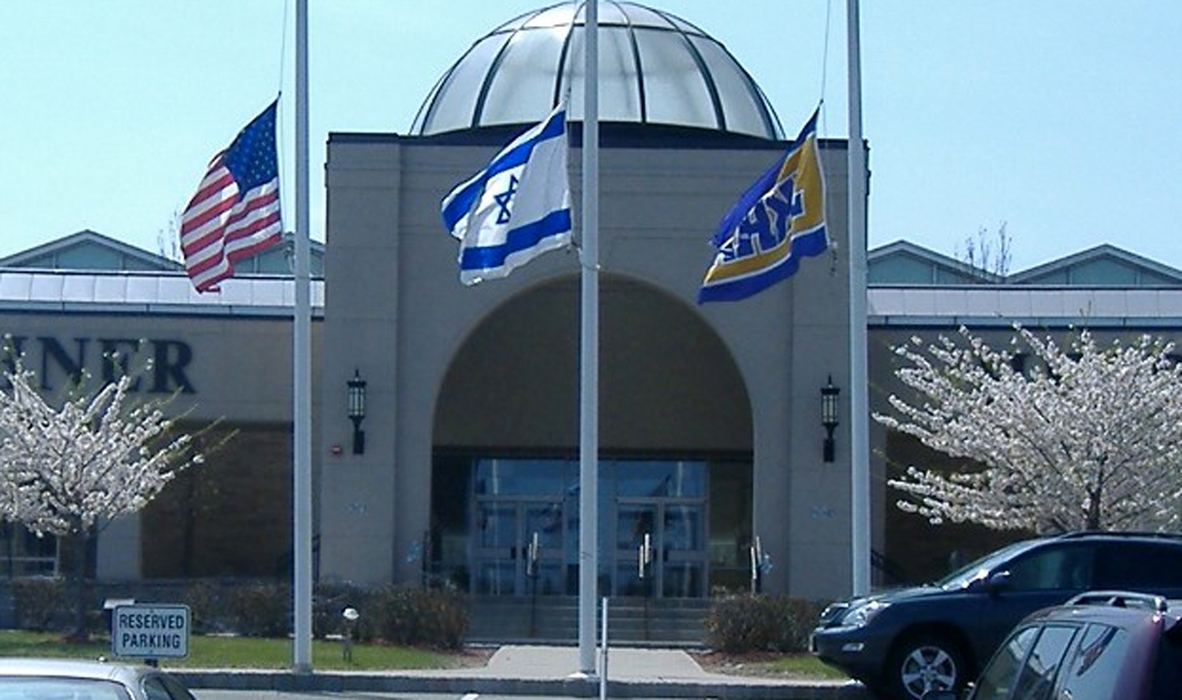SAN FRANCISCO (JTA) – When Rabbi Serena Eisenberg took over as the Hillel director at Brown University in the fall of 2005, she was surprised there wasn’t an Israeli flag in the group’s building.Eisenberg thought one should go up. But the issue proved divisive among students.”The Israeli flag is a potent symbol with many different meanings for different people,” said Benj Kamm, who was then the Hillel student president. “Most people, but not all, agreed that the flag was an Israeli nationalist symbol, although people disagreed about to what extent we as a Jewish community were obligated to support Israel, and in what ways.”Some students wanted a flag; others didn’t. The important thing, Kamm said, was to keep the discussion open.”I heard various proposals during my time at Brown: a flag, no flag. A flag, and also a Palestinian flag. A flag, but not in the main entryway,” said Kamm, who has since graduated from Brown.Finally in the fall of 2006, the Hillel staff put up the Israeli and American flags, neither of which had flown for years. They did it without approval from students, who at Brown sit on Hillel’s board of trustees.That didn’t sit well with some. Kamm said he was “frustrated and disappointed” that the “decision had been made by fiat.”Eisenberg insists the issue “hasn’t been controversial” since the flags went up. Hillel continues to facilitate conversations about Israel and Jewish identity, she said, and while the flag “can be an important lightning rod for that discussion,” the deeper issues are really the point.The Brown Hillel isn’t the only American Jewish group to question whether it should fly the Israeli flag. Other Jewish student groups, organizations and congregations have had similar discussions, with varied results.For American Jews the Israeli flag is indeed, as Kamm put it, a potent symbol. For some it represents solidarity with the Jewish people. For others it celebrates Israeli statehood after 2,000 years of struggle. And for others it signals approval of the Israeli government and its policies.”To me it’s the flag of the Jewish people,” said Vavi Toran, a San Francisco Jewish educator who was born in Israel. But, she admits, the flag “has a lot of baggage – a Star of David, a tallit,” or prayer shawl.”It was a symbol of the Zionist movement before the State of Israel. But it’s no longer just that, what it was supposed to mean.”The Hillel at the University of Michigan in Ann Arbor has long displayed Israeli flags in its building, but until recently did not hang one at the front entrance. Two years ago a student brought a motion to put one there.The motion passed, but former Michigan Hillel governing board chair Perry Teicher said it generated intense conversation.While Teicher said Hillel members “are not uncomfortable” displaying the Israeli flag – and he himself is glad it’s there – the group was concerned about sending a welcoming message to unengaged Jews and non-Jews walking in the door.”We asked, what is the most effective way to welcome in people who might not agree with Hillel’s stand on supporting Israel?” Teicher said. “Would this live up to the university’s ideal of engaging people in conversation who may not agree with you?”Wayne Firestone, president of Hillel: The Foundation for Jewish Campus Life, said it is appropriate that Jewish students have these conversations and that Hillel facilitates them.”Israel is a central part of our Jewish identity, and with that comes questions,” he said. “New populations of young students are coming into a learning environment, and having them ask why there’s a flag is a good thing.”Firestone likens it to the Passover Haggadah.”Hillel is like the seder table – we invite all four kinds of children to come and ask their questions, not just the questions we like,” he said.Synagogue debate on the issue adds a new dimension: How appropriate is a nationalist symbol in a place of worship?No stream has an official policy on the question. There are a handful of Reform, Conservative and Orthodox responsa, or rabbinical opinions, all decades old. They tend to agree that it’s acceptable but not compulsory – and perhaps not even preferable – to display any flag in the sanctuary. But the decision is left to individual congregations.Rabbi Dan Freelander, vice president of the Union for Reform Judaism, says it’s “very customary” for a Reform congregation to display the Israeli flag along with the American flag, either in the sanctuary or elsewhere in the building.But he notes that the practice waxes and wanes along with Israel’s position on the world stage. In times of peace and prosperity, more groups put up a flag; in times of violence, or when a Jewish group disagrees with something Israel is doing, they tend not to display the flag.That, he said, is as wrong and illogical as disowning your parents when they make you angry.Most synagogues don’t have an articulated policy on flags. The question arises only when a special event is planned.In 2000, Toran worked with Congregation Sha’ar Zahav in San Francisco on a memorial for the fifth anniversary of the assassination of Israeli Prime Minister Yitzhak Rabin. She was shocked when some congregants said they did not want the Israeli flag at the event.”I could understand if they didn’t want the memorial at all, but to honor the prime minister of Israel, who was assassinated, how could you not have the flag?” she asks.In the end the flag was displayed, Toran recalls, but not after what she characterizes as a long and bitter debate. The congregation was not able to find anyone to speak to JTA about it.Congregants sometimes take matters into their own hands. Or Shalom, a Jewish Renewal congregation in San Francisco, meets in a Conservative synagogue that displays the American and Israeli flags in its sanctuary. Or Shalom leaves them in place, but some congregants take them down for their family members’ life-cycle rituals.Or Shalom member Charlie Varon had the flags removed for his first son’s bar mitzvah, and will do it again in August for his second son’s bar mitzvah.”I don’t want them in my sanctuary,” he said.Varon, a noted playwright and performer whose mother was born in Jerusalem, says he has “a very strong connection to Israel.” That’s not the issue.”For me the religious quest is a searching for the universal and eternal. I don’t see a place in that search for the nation-state,” he said.Ultimately, Teicher said, putting up or taking down the flag should not be seen as the end of the discussion; it should prompt conversation.”You have to focus on what are the Israel programs on campus, what’s the campus discourse on Israel and the Mideast,” he said. “You can’t just do that by throwing up an Israeli flag, and that’s the end of it.”
JTA has documented Jewish history in real-time for over a century. Keep our journalism strong by joining us in supporting independent, award-winning reporting.






